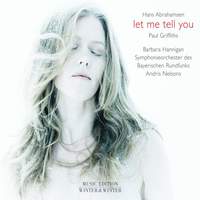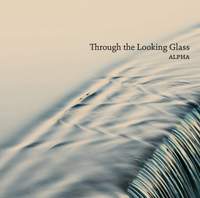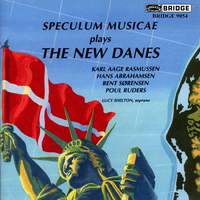Interview,
Hans Abrahamsen - Let me tell you
 With the 400th anniversary of Shakespeare's death just around the corner, and stellar reviews still coming in from last week's performances in New York, it seemed like high time to investigate one of the most original and most-praised pieces of new music in recent years - Hans Abrahamsen's 2013 song-cycle Let Me Tell You, setting a Shakespeare-inspired text by Paul Griffiths. Winner of the 2016 Gawemeyer Award, the work is now available on CD and vinyl from Winter and Winter the Munich-based label, with Andris Nelsons (who gave the work's premiere) conducting the Symphonieorchester des Bayerischen Rundfunks.
With the 400th anniversary of Shakespeare's death just around the corner, and stellar reviews still coming in from last week's performances in New York, it seemed like high time to investigate one of the most original and most-praised pieces of new music in recent years - Hans Abrahamsen's 2013 song-cycle Let Me Tell You, setting a Shakespeare-inspired text by Paul Griffiths. Winner of the 2016 Gawemeyer Award, the work is now available on CD and vinyl from Winter and Winter the Munich-based label, with Andris Nelsons (who gave the work's premiere) conducting the Symphonieorchester des Bayerischen Rundfunks.
Written for the charismatic and fearless Canadian soprano Barbara Hannigan (who sings on the recording) and scored for voice and large orchestra, the work sets the words which Shakespeare gives to Ophelia in Hamlet, but with a difference: they are re-ordered to tell the story of a modern Everywoman grappling with issues such as memory, desire and loss in a frozen landscape which evokes an atmosphere similar to that of Schubert's Winterreise and (as I discovered) several of Abrahamsen's own earlier works. I called Hans in Copenhagen recently to find out a little more behind about the genesisi of this remarkable piece…
This is your first work for voice and orchestra to date: why did you decide to do this now, and what was the working process like for the piece?
It is indeed my first large-scale piece for voice; I did a couple of smaller pieces for voices and instruments back in the 70s, when I was in my twenties (I think the last one I did was the Flowersongs, in 1973…). Then I had some opera plans but somehow they didn’t work out…but texts, literature, in fact ALL art, have always inspired me. So when Barbara Hannigan asked me about writing this piece to Paul Griffiths’s text, it was a challenge for me because I hadn’t written any substantial works for voice for so long!
What special qualities of Barbara’s voice and stage-presence did you know you wanted to work with when you started writing?
I met Barbara first in Amsterdam, when she performed a transcription I made of Schoenberg’s lieder, the very early songs, with Reinbert de Leeuw and his great Netherlands Schönberg Ensemble, and that was when I heard her for the first time – that wonderful voice, so refined, with so many colours, and so much personality coming through in it! I knew then that there was just so much that Barbara could do with her voice – with vibrato, without vibrato, from very, very fragile, almost innocent, to something that’s incredibly powerful. I have heard her sing so many things since then, including George Benjamin’s wonderful opera Written On Skin, which I heard after I’d written my piece – I heard it in Paris, in fact, when I went there to work with Barbara a couple of months before the premiere (of Let Me Tell You) in 2013. It was just so very inspiring working with her - and also of course with Paul.
Did you collaborate with Barbara directly during the writing process?
It was not while I was writing the piece, but before. The story was actually that it was Paul’s wife who suggested Barbara, and then Barbara who suggested me: she had heard about my piece Schnee, and she asked me, and the next step was to read this novel by Paul (which I already had because he’d sent it to me!), and before Barbara suggested it, it had already been in my mind to make something around it. It’s so beautiful – the entire book is based on the words which Shakespeare gives to Ophelia in Hamlet (481 words, I think), and Paul has centred this novel around a young female (she’s never actually named) who’s dreaming in a magical way around the story, in a new way - but always using these words.
The last stanza, No. 40, is very much about snow, which inspired me very much…but what Barbara asked me was somehow to choose several sections from the book which I wanted to be a part of the piece, and I chose eight sections (which I thought of as eight songs), about memory, about time, about love, about walking in the snow, walking OUT into the snow, about music and what music does. I met with Barbara one year before I started to compose, in Berlin, and we talked about these eight sections…they were sent on to Paul in Wales and he responded very quickly the next day - he was very, very generous and receptive to my ideas and reworked the text a little, also dividing it into three parts dealing with the Past, the Present and the Future, and when he sent that back to us and we were so happy with what he’d done.
Around the same time Barbara and I met up in a conservatoire, and she gave me a very good vocal lesson! We talked about how to write vocal music - how to use the colours in the voice, how to connect the line with the vowels, and how to set text in different registers and so on, all these things…I learnt a lot and bore that in mind when writing! Then I actually went off and wrote another piece – I wrote my Fourth String Quartet – and when that was finished then I started [Let Me Tell You]. When I composed the piece I had of course Barbara’s voice and her personality in mind, I was writing it very much for her… then suddenly the Berliner Philharmoniker became involved! In the beginning, it could have been for voice and piano, or for voice and instrumental ensemble - but Barbara suggested it to the Berlin Phil and they responded very quickly and wanted to make it into a commission, which was fabulous of course!
Did you start with vocal line or with orchestral textures?
My pieces are somehow very much growing out of each other - all my pieces are somehow connected, and when I start a piece I often somehow continue working on the same ideas, but also combine the different ideas, sometimes very old ideas…For example with Schnee, I was working with ideas there from my pieces from the beginning of the 70s, jumping back years to a very early piece called 10 Preludes, and to Winternacht (inspired by a text by the Austrian poet Georg Trakl). I started [Let me tell you] with many, many ideas from Schnee and from my Fourth String Quartet, and from my Double Concerto - but all worked into a new piece.
The piece moves through the past, present and future. In the first song she sings 'Let me tell you how it was’, in No. 4 ‘Let me tell you how it is’, and in the last one she says 'I know you are there, I know I will find you...Let me tell you how it will be': the music here comes straight out of the very first canon from Schnee – the snow music itself! And then in the second song, where she’s singing about memories, and what memory is, this music is again from Schnee, woven together with something from the Fourth String Quartet. And so on. Then of course I respond to things in the text: when Paul is talking about the journeys we make and will make again, well - it’s like…knitting a long cardigan! And as you do that, something comes up and emerges in the music only for a moment and disappears.
Do you have any further plans to write for voice and orchestra, or even for the stage?
Just now I am working on an opera! After Let Me Tell You, somehow working with text brought new inspiration, and now I am working on a commission from the ROH Copenhagen; the idea for the opera came when I was writing Schnee in 2007, or thereabouts. At that time I was reading and investigating the ‘snow’ theme, and then I read the fairy-tale by Hans Christian Andersen – the story of Kai and Gerda, where Kai is wrecked by the Snow Queen and Gerda goes out into the world to find him and to rescue him. I made my own libretto based on those words, and up until four years ago it was only an idea – but since then I have worked on it with people at the Opera House and now it’s actually happening!
Let me tell you was released in January on Winter and Winter.
Available Formats: CD, MP3, FLAC, Hi-Res FLAC
Related works by Hans Abrahamsen
Alpha; also includes works by Per Nørgård, Poul Ruders and Bent Sørensen
Available Formats: CD, MP3, FLAC, Hi-Res FLAC
William Purvis, Speculum Musicae; also includes works by Karl Aage Rasmussen, Poul Ruders and Bent Sørensen
Available Formats: CD, MP3, FLAC





![Schnee [download only]](https://d1iiivw74516uk.cloudfront.net/eyJidWNrZXQiOiJwcmVzdG8tY292ZXItaW1hZ2VzIiwia2V5IjoiNzk4MzY1MC4xLmpwZyIsImVkaXRzIjp7InJlc2l6ZSI6eyJ3aWR0aCI6MjAwfSwianBlZyI6eyJxdWFsaXR5Ijo2NX0sInRvRm9ybWF0IjoianBlZyJ9LCJ0aW1lc3RhbXAiOjE0NjQ3ODQ1ODh9)
